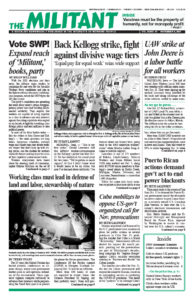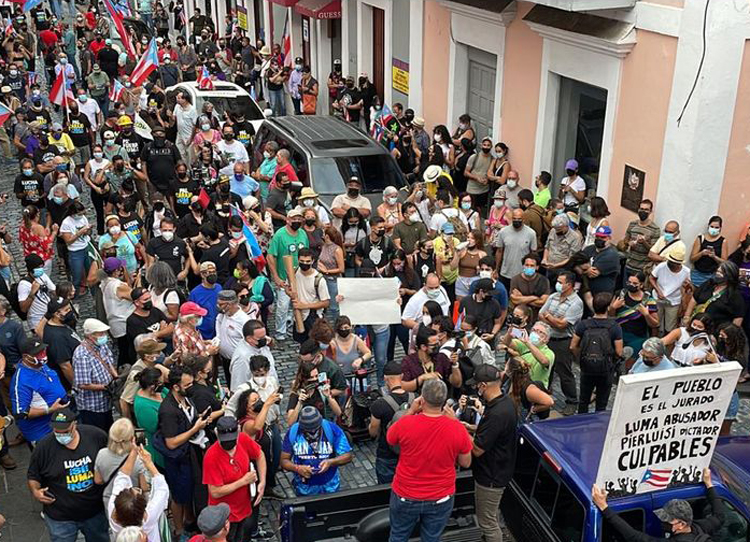Thousands took to the streets of San Juan Oct. 15 to demand the Puerto Rican government cancel the obscenely lucrative contract it gave Luma Energy, a privately owned U.S.-Canadian joint venture, to take over the U.S. colony’s electrical transmission and distribution network.
Gov. Pedro Pierluisi and the Financial Oversight and Management Board for Puerto Rico, imposed by Washington to assure its control over the U.S. colony’s economy, had claimed that privatizing the grid would lead to “reliable electricity.” Instead, since Luma took the system over from the government June 1, it has raised electric rates, while blackouts have become longer and more frequent.
According to Luma’s own website, on most days more than 100 neighborhoods are without power.
The deal is one more example of how U.S. imperialism uses Puerto Rico’s colonial subjugation to plunder its wealth and resources.
“Sometimes the lights go off for seven or eight hours,” Samuel Segarra, a tow-truck owner, told the Militant by phone from the Puerto Nuevo neighborhood of San Juan. Segarra is a spokesperson for Camiones Unidos, one of several groups of independent owner-operators that were part of a strike last month that forced the government to raise minimum mileage rates.
The fluctuations in power “ruined my refrigerator, machines I use to make keys for my work, and a machine I need to sleep at night,” Segarra said. For many on the island — including those who depend on insulin, which needs to be refrigerated — power interruptions are a matter of life or death.
Under the terms of the 15-year deal, the government is paying Luma more than $100 million a year, in addition to control over some $10 billion promised by the Federal Emergency Management Agency, ostensibly to repair damage from 2017’s Hurricane Maria, and to modernize the antiquated and deteriorating electric system. But Luma has not released any plan for how this would be done. The company has not replied to the Militant’s requests for information.
For more than a decade PREPA — the Puerto Rico Electric Power Authority — had steadily cut the number of linemen and other essential workers and increasingly skimped on even routine maintenance, while saddling the government with $9 billion in debt and an electrical system on the verge of collapse. It declared bankruptcy in 2017.
As part of the deal, Luma told the utility’s workers they had to reapply if they wanted to keep their jobs. And that they would not be offered their previous benefits. Some 75% refused, transferring to other government agencies or retiring. “They got rid of a lot of workers with experience and further reduced the size of the workforce,” said Segarra, saving millions for the bosses at the expense of working people.
Imperial arrogance
In a show of imperial arrogance, the owners of Luma refused to answer questions from the Puerto Rico legislature about its operations, agreeing instead to give information to the U.S. Congress’ Natural Resource Committee. That’s how news got out that top Luma executives are getting salaries of over $200,000 a year and CEO Wayne Stensby gets $500,000.
“That’s more than the president of the United States!” Johnny Rodríguez Ortiz, president of the Association of Retirees of the Electric Power Authority, told the Militant. He worked for 29 years in one of the utility’s electric generation plant.
Even before Luma took over most of the government utility’s operations, PREPA — which still runs the generation plants — owed more than $441 million to the workers’ pension funds.
“The retirees are worried that we will end up with zero pensions,” Rodríguez said. “We’ve been sending letters to the government, but no one answers us.”
The government tried to block people from getting to the Oct. 15 demonstration, Rodríguez said. “The mayor of San Juan prohibited parking in the public lots and from parking anywhere within a half kilometer of the march,” and police blocked off some access points to the area. “Despite that we filled the streets,” he said. Numerous union contingents joined the action.
In the midst of the controversy over Luma, the Puerto Rican legislature put on a show of protest against the “Amended Plan of Adjustment” — which the Financial Oversight Board drew up to impose on the island — by refusing to immediately issue $7.4 billion in new bonds to finance it.
The bipartisan Junta, as the board is known in Puerto Rico, was appointed by President Barack Obama in 2016 to wield power over Puerto Rico’s government and maximize its payment on more than $72 billion debt owed to bondholders by the island’s government agencies. In addition, the government owed $55 billion to various retirement funds.
Over the last decade the government has laid off thousands of workers, raised sales taxes, and slashed government programs, all while printing more bonds, growing the debt even higher.
The Junta claims that the new plan is a “milestone” for Puerto Rico. They say the bondholders have agreed to reduce the debt to some $34 billion, as long as the colonial regime pays $7 billion up front and $1.15 billion a year for debt service. The plan is also contingent on slashing government pensions for at least 16% of retirees. The Junta considers any pensions over $2,000 a month excessive.
Gov. Pierluisi assured the Junta and bondholders that with minor changes he will get the deal done. “It’s all colonialism,” retiree leader Rodríguez says. “That’s why we have to keep organizing in the streets.”


